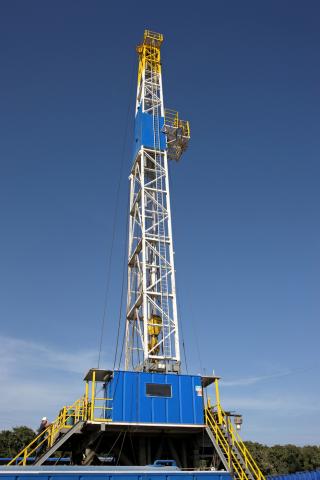When does a study on the unconventional shale gas industry become a “shill gas study”? The quick answer: when nearly everyone writing and peer reviewing it has close ties to the industry they’re purportedly doing an “objective” study on.
The newest kid on the block: a recent study published by SUNY Buffalo’s Shale Resources and Society Institute, titled, ”Environmental Impacts During Shale Gas Drilling: Causes, Impacts and Remedies.”
The four co-authors of the “study” all have backgrounds, directly or indirectly, in the oil and gas industry:
-
Timothy Considine and Robert Watson: A professor emeritus at University of Wyoming and a professor at Pennsylvania State University respectively, Considine and Watson co-authored a Marcellus Shale Coalition “jobs” study often cited by the industry and mainstream press titled, “The Economic Impacts of the Pennsylvania Marcellus Shale Natural Gas Play,” published in May 2010. The Marcellus Shale Coalition is a gas industry lobbying group representing nearly all of the corporations fracking for gas in the Marcellus. That “jobs” data was used in a July 2011 New York fracking jobs “study” shown to be farcical by Food and Water Watch in a November 2011 report, as covered by DeSmogBlog.
-
Nicholas Considine: Head of the University of Wyoming’s Center for Energy Economics and Public Policy. He co-authored, along with his brother Timothy and Robert Watson, a Manhattan Institute-commissioned paper published in June 2011 titled, “The Economic Opportunities of Shale Energy Development.” The Institute is heavily funded by the oil and gas industry.
- John Martin: Martin is a Consultant at JPMartin Energy Strategy LLC. According to his biography appearing on the JPMartin website, he has spent decades working in various sectors of the oil and gas industry, during which he also was responsible for overseeing the research and writing of the first examination of “the natural gas potential of New York’s Utica Shale that helped stimulate significant industry investment in this resource.” Martin also serves as co-director of the recently created SUNY Buffalo’s Shale Resources and Society Institute, which published this “study.”
Digging deeper, the Buffalo study also had a Peer Review panel. That panel had five reviewers, four of five of which have ties to the oil and gas industry:
-
Andrew Hunter is a lecturer at Cornell University’s School of Chemical and Biomolecular Engineering. Hunter, according to the biography appearing on the Cornell website, formerly worked in the oil and gas industry from 1958-2005. He worked for companies ranging from Caltex Petroleum Inc., Petroleum Intelligence Research Associates and Petroleum Database Services Inc.
-
Brigham McCown is a former U.S. Department of Transportation executive and consultant with United Transportation Advisors. (The only reviewer with no obvious connections to the gas industry.)
-
George Rusk is a regulatory specialist at Ecology and Environment, Inc. It is a “recognized global leader in environmental management,” according to its website and provides a mulplicity of services for offshore oil, oil and gas pipelines, and gas storage.
-
Scott Anderson is the senior policy advisor with the Environmental Defense Fund’s (EDF) Energy Program. As covered previously on DeSmogBlog, Anderson formerly worked in the oil and gas industry and is a former executive vice president and general counsel for the Texas Independent Producers and Royalty Owners Association. He is also a member of the Interstate Oil and Gas Compact Commission, which opposes extending the federal Safe Drinking Water Act to hydraulic fracturing.
- Robert Jacobi is co-director (with John Martin, highlighted above) of the Shale Resources and Society Institute and longtime UB professor of geology. He has also made a career in the oil and gas industry, working as an engineer consultant for corporations ranging from EQT Corporation, Norse Energy Corp and Talisman to others.
The Shale Resources and Society Institute ”study“ concluded that between Jan. 2008-Aug. 2011, ”1,844 of the [Pennsvylvania Department of Environmental Protection (DEP)] violations [by the gas industry], or 62 percent, were administrative and preventative in nature. The remaining 1,144 violations, or 38 percent, were environmental in nature.”
Left out of the study is the fact that, as a May 10 Cleveland Plain Dealer report shows, a majority of wells are not even inspected in the state of Pennslyvania by the DEP. In 2009, the DEP inspected 23% of its wells, 24% in 2010 and 35% in 2011, with 84 hired inspectors to examine what grew to 69,000 wells by 2011 in the state.
Underinspection and lack of inspectors is a nationwide trend that can be seen in other places such as Ohio, Colorado, Texas and Oklahoma, according to the story.
“Fact-Based, Objective Information”?
The Shale Resources and Society Institute says that it exists to provide neutral, scientific information to the mass public. “We’re really trying to provide fact-based, objective information,” Martin told the Buffalo Star Gazette in an April 2012 story. “We’re guided by science.”
Really?
If this most recent “shill gas” study’s cast of characters shows anything at all, it makes a mockery of that claim.
Image credit: Shutterstock | Cindi Wilson
Subscribe to our newsletter
Stay up to date with DeSmog news and alerts






